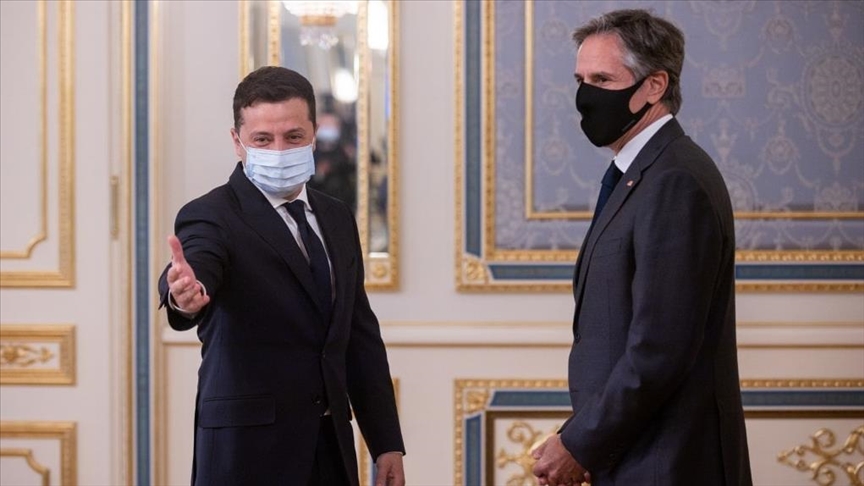The Ukrainian Foreign Minister, Dmytro Kuleba, assured this Wednesday that the Government is not opposed to the proposals sent to Russia – to which Digital Column has had access -, which propose disarmament plans and also promise not to deploy US troops and missiles in Ukraine. Washington and the Atlantic Alliance condition the success of the negotiations and the plans on Russia, which has concentrated some 130,000 soldiers along the borders with Ukraine, starting a de-escalation. In addition, they emphasize in their documents delivered to Moscow last week by the US ambassador to Russia, John Sullivan, that NATO’s open-door policy is non-negotiable.
“Although the United States does not have missiles or combat units in Ukraine,” Dmytro Kuleba pointed out, “Russia has both,” added the foreign minister in a videoconference in which he recalled that Ukraine has been at war for eight years in the Donbas region. against separatists who receive political and military support from Russia. Moscow annexed the Ukrainian peninsula of Crimea in 2014 with a referendum considered illegal by the international community and which has turned that strategic territory into a “military fortress”, according to observers.
If this proposal is accepted on a reciprocal basis, that will mean that Russia has to withdraw. So we have no objections to the idea of Russia withdrawing its forces, its personnel and its weapons from the territory of Ukraine,” added the minister on the response of NATO and the United States to Russia’s demands, which demands a withdrawal of the Alliance to the positions it held in 1997, that it withdraw its membership invitation to Ukraine and Georgia and that it does not operate in Eastern Europe, Central Asia and the Caucasus, which it considers to be part of its sphere of influence.
Ukraine and the United States — Russia’s chosen interlocutor, ignoring the European Union, despite the fact that the Kremlin’s rhetoric and military buildup have caused a major security crisis in the Old Continent — are on the same page, Kuleba said.
The Kiev government also shares a vision with Washington and its partners when evaluating the Russian escalation. And this despite the fact that the Ukrainian president, Volodímir Zelensky, has made an effort these days to lower the alarms raised by Joe Biden and the White House, who have assured that they have information that Russia may launch another military aggression against Ukraine “imminently”. “Ukraine and our partners, including the United States, have no difference in assessing the risks of the current Russian escalation,” Kuleba said. “The tone of voice of our messages may sound different, but the real assessment is the same: everything is possible and we must prepare for every possible scenario,” added the Ukrainian Foreign Minister, who thanked his Western allies for the diplomatic support and the arms shipments and defense assistance.
Kiev believes that the accumulated troops are still “insufficient” for a large-scale military operation. However, Kuleba warned, there are other scenarios and “other means,” such as cyberattacks or organizing riots. The Kremlin’s “plan A” is to “destabilize” Ukraine, the foreign minister has insisted.
Ukraine tries to bolster its defense with arms shipments from its partners. Digital Column, with 44 million inhabitants, has tripled its defense budget since 2013 and has received funds, loans and weapons from the United States and the United Kingdom, but its figures and its Army are not comparable to those of Moscow. Kiev, Kuleba said, needs defensive weapons to support “diplomatic efforts.” For now, such “strong diplomacy” is helping deter the threat of a military offensive.
The government of Volodymyr Zelensky, a former comic actor who swept the 2019 elections with an anti-corruption speech and the promise to stop the war in the East, in which some 14,000 people have lost their lives, according to UN estimates, is receiving these days an agitated cloud of NATO leaders in Kiev, who intend to make their support visible. Ukraine wants, however, to end this “ambiguity” about the prospects for ties and integration of the country towards the Euro-Atlantic path. “It is time to end the harmful ambiguity that serves as a temptation for the Kremlin to continue its attempts to undermine Ukraine or reverse its course against the will of the Ukrainian people,” Kuleba said.
After independence from Russia in 1991, with the collapse of the Soviet Union, Ukraine has tried to go its own way. In 2013, the pro-European and anti-corruption protests consolidated this turn towards the EU and the Russian threat, with the annexation of Crimea and the war in Donbas, has finished tilting it towards NATO. Russia, meanwhile, wants to keep the former Soviet republic under its wing. Ukraine has barely made progress on its path to NATO accession since receiving the invitation in 2008. “A failure of the West in Ukraine will send a message to the whole world that the West is unable to defend its fundamental principles and therefore unable to defend himself,” Kuleba warned.

